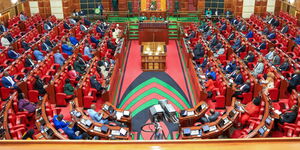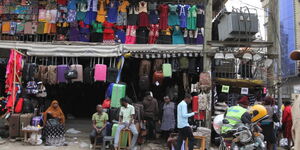The Central Bank Governor Dr Patrick Njoroge has expressed optimism over the Central Bank Amendment Bill 2021 which seeks to tame digital lenders.
However contrary to expectations, Kenyans should not expect significant reduction in the interest rates charged by the digital leaders, when the CBK Amendment Bill 2021 comes to effect.
The governor maintained that the regulation does not intend to put a cap on rates upon implementation but only intends to streamline the sector adding that the regulation is long overdue.
While responding to questions during the last post Monetary Policy Committee (MPC) briefing for the year, the governor noted that, “If you mean ourselves having sort of caps and things like that, obviously the answer is NO, we are not going into that part of the world again.”
Insisting that the CBK will ensure there is fair pricing of credit by digital lenders,” what we will do and have been doing say on the banking side with regards to banks, is ensuring that the pricing is appropriate.”
The regulator has further hinted that the same measures that banks have been forced to subscribe to could be applied to digital lenders once the bill becomes law.
“You have already seen what we have done on the banks and we have talked about the pricing principles that we have. We have talked about things related to how they should treat customers so that’s really a good model to start from” he insisted
Digital lenders have been at loggerheads with the regulator over interest rates charged but some of the players in the market which experts have described as exorbitant and exploitative.
According to Digital lenders association of Kenya (DLAK) Chairperson Kelvin Mutiso, digital lenders are looking forward to being regulated in order to weed out players who have been taking advantage of customers
This comes as credit appetite in the country has been on the rise, with the number of credit defaulters also increasing due to ease of access to loans through digital platforms.
A recent report by the DLAK shows that more than 60 per cent of Kenyans still consider digital platform as their first choice for credit while conventional players such as banks come in as the last option.
What remains to be seen is the changes that the regulation will present to the credit market which has been over ran by unregulated and mushrooming lenders.
Digital lending platforms have been blamed for the increasing number of defaulters being negatively listed with Credit Referencing Bureaus in the country that led to a directive by the president to half the listing.
On October 20, during Mashujaa Day celebrations, President Kenyatta announced the suspension of CRB listing for Kenyans with loans of less than Sh5 million that were defaulted from October 2020.
“The relevant authorities will, for loans less than Sh5 million, effect a moratorium of listing in CRBs for a period of 12 months to end September 2022,” President Kenyatta said then.












